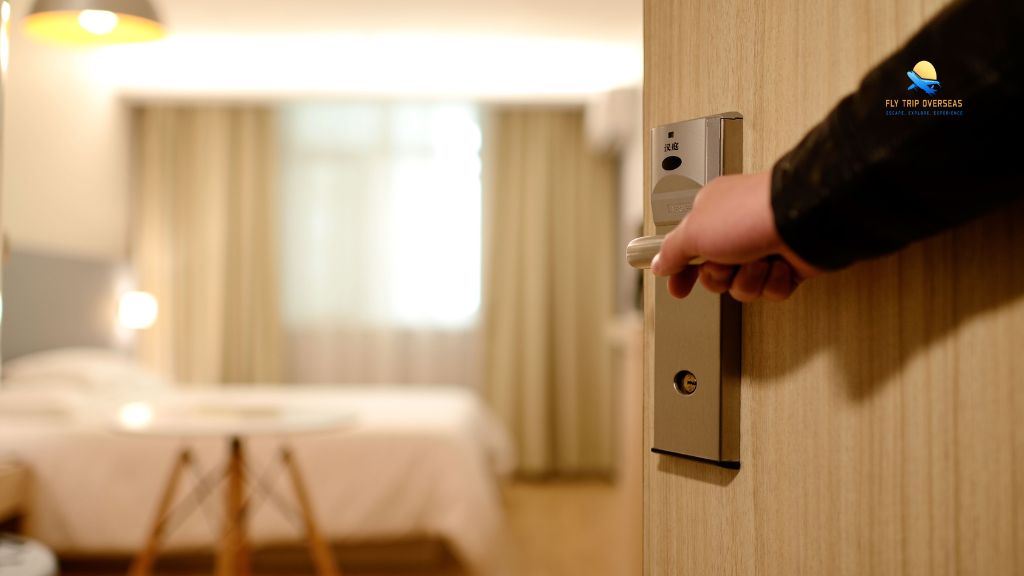Hotel star ratings help travelers judge quality, comfort, and amenities at a glance—understanding them ensures smarter hotel choices for every budget.
Choosing the perfect hotel can be overwhelming, with many options and varying quality levels. One of the most common ways travelers judge hotels is through the hotel star ratings system. But what do those stars mean? At FTO Travels, a leading travel agency in Dhaka, Bangladesh, we’re here to help you understand the hotel star rating system so you can make informed choices wherever you go.
What Are Hotel Star Ratings?
At its core, hotel star ratings are an evaluation. It’s a snapshot of a hotel’s facilities, services, and overall quality, designed to help travelers gauge the level of comfort and luxury they can anticipate. While the idea of a universal hotel star ratings system is appealing, the reality is more fragmented. Independent bodies, government tourism ministries, and even travel associations worldwide operate their distinct criteria.
This divergence in systems means that while stars offer a general indication, a direct, apples-to-apples comparison between a “4-star” hotel in Paris and a “4-star” hotel in Bangkok isn’t always straightforward. However, understanding the foundational principles behind these classifications allows you to make more informed decisions, ensuring your accommodation aligns perfectly with your travel style and expectations.

Common Factors in Hotel Star Ratings Systems
Regardless of the body assigning the stars, most use these standard criteria:
-
Room quality and size:
Higher-rated hotels offer larger, better-furnished rooms with upgraded linens, mattresses, and amenities like minibars and workspaces.
-
Cleanliness and maintenance:
Regular housekeeping and well-maintained facilities are essential across all ratings but have become increasingly stringent at higher star levels.
-
Service and staffing levels:
1 or 2-star hotels may offer limited front-desk support, while 4 and 5-star hotels provide 24/7 concierge, valet, and personalized services.
-
Available amenities:
These include air conditioning, room service, spas, gyms, pools, business centers, and Wi-Fi. More stars generally mean more amenities.
-
Dining options:
Basic dining or breakfast may be available in lower-rated hotels, while luxury hotels offer multiple gourmet restaurants, bars, and 24/7 room service.
-
Safety and security:
Top-rated hotels often provide in-room safes, CCTV surveillance, keycard access, and round-the-clock security personnel.
-
Recreational and leisure facilities:
Higher-star hotels often feature spas, fitness centers, entertainment rooms, and organized activities.
-
Accessibility and guest services:
Services such as multilingual staff, transport shuttles, and guided tours are commonly found in 4-star and 5-star establishments.
Hotel Star Ratings Breakdown
- 1-star hotels are the most basic in terms of service and amenities. These accommodations typically offer a clean place to sleep with minimal furnishings—usually just a bed, a small bathroom, and perhaps a television or fan. There are no on-site dining options or concierge services, and housekeeping may be limited. These hotels are best suited for budget-conscious travelers or backpackers prioritizing affordability over luxury.
- 2-star hotels provide a slight upgrade from the 1-star category. Rooms may include modest décor, better furnishings, and additional services like daily housekeeping or 24-hour front desk support. Basic amenities such as complimentary breakfast or limited room service might be available. While still affordable, 2-star hotels are often located in convenient areas near public transportation or local attractions, making them a practical choice for short stays or business travel on a budget.
- 3-star hotels offer a balanced mix of comfort, convenience, and affordability. Guests can expect clean, spacious rooms with quality furnishings, in-room amenities like a mini-fridge or coffee maker, and on-site services such as a restaurant, cafe, or business center. These hotels often cater to business and leisure travelers. They may provide meeting rooms, fitness centers, and concierge support. The experience is generally more polished, focusing on customer service and guest satisfaction.
- 4-star hotels represent a more upscale tier of hospitality. These establishments feature stylish, well-appointed rooms with premium bedding, modern technology, and designer furnishings. Services often include 24-hour room service, valet parking, concierge assistance, and multiple high-end dining options. Additional facilities may include a swimming pool, spa, gym, or executive lounge. The overall experience is refined and personalized, appealing to guests who expect comfort and elegance during their stay.
- 5-star hotels deliver an exceptional level of luxury, service, and sophistication. These elite properties are often architecturally impressive and located in prime city areas or scenic destinations. Guests can enjoy lavish suites with exquisite décor, gourmet dining at award-winning restaurants, full-service spas, and highly personalized attention, including private butlers or dedicated concierge teams. Every detail, from check-in to departure, is designed to provide a seamless and indulgent experience. These hotels cater to high-end travelers, celebrities, diplomats, and business executives seeking the finest hospitality.

Beyond the Stars: Other Factors for Hotel Quality
While hotel star ratings are an excellent starting point, a truly informed decision requires considering other crucial factors.
Location Matters Most!
An ideally situated 3-star hotel can be far more appealing than a luxurious 5-star property if the latter is inconveniently located. Proximity to attractions, public transport, business hubs, or tranquil natural settings can significantly impact your trip’s success.
Guest Reviews Are Key
Genuine guest reviews on TripAdvisor, Google Reviews, and Booking.com are invaluable in today’s digital landscape. They offer firsthand accounts of a hotel’s cleanliness, staff professionalism, actual amenities, and overall ambiance – details that stars alone can’t convey. Look for consistent patterns in feedback.
Brand Reputation
Many international hotel chains strive for consistent standards across their properties. Opting for a recognized brand can offer confident assurance, even within different hotel star ratings system tiers, as they often adhere to internal quality benchmarks.
Your Specific Needs
Do you require a pet-friendly policy, an accessible room, a swimming pool for the kids, or free parking? Always cross-reference the hotel’s amenities list with your non-negotiable requirements, as stars don’t always detail these specific features.
The Hotel’s Vibe
Like people, hotels have personalities. Some are chic, others grand and traditional, or perhaps cozy and boutique. A hotel’s “vibe” or aesthetic, which isn’t always captured by star ratings, can significantly influence your overall enjoyment. Browse photo galleries and read descriptive summaries to feel the atmosphere.
Hotel Classification System in Bangladesh
In Bangladesh, the Ministry of Civil Aviation and Tourism regulates the hotel classification system in coordination with the Bangladesh Parjatan Corporation. Hotels are officially classified from one star to five stars based on room size, service quality, amenities, location, hygiene standards, and staff training. The government also issues star ratings through inspections and mandates periodic reviews to ensure hotels maintain their standards.
In 2014, the government introduced a comprehensive hotel classification guideline modeled after international practices, which includes a checklist of more than 100 criteria. Hotels must apply to be officially classified and are awarded star ratings upon meeting these standards. This helps ensure consistency and builds confidence for both domestic and international travelers.

Who Determines Hotel Star Ratings?
It’s critical to reiterate: the global hotel star ratings system is not unified. This lack of standardization is perhaps the most confusing aspect for international travelers.
Navigating Regional Divergence
Different entities in various parts of the world implement their unique rating methodologies.
- Examples of prominent systems include:
- Forbes Travel Guide (North America): Renowned for its stringent, anonymous inspections focused on service excellence.
- AAA Diamond Ratings (North America): This organization utilizes a comprehensive checklist to assign diamond ratings to hotels and restaurants.
- Hotels Combined / Trivago’s Aggregated Ratings: These platforms often aggregate ratings from multiple online sources, providing a weighted average.
- National Tourism Boards: Many countries, such as Spain (where classification is regional), Germany (German Hotel and Restaurant Association), or the UK (VisitEngland/AA), have government-mandated or officially endorsed systems.
- Online Travel Agencies (OTAs): Platforms like Booking.com, Expedia, and Agoda often have their internal rating systems based on user reviews and a quality consensus, which may or may not perfectly align with official classifications.
- Michelin Guide: While famous for restaurants, it also rates hotels, primarily in Europe, using a similar star system to its restaurant ratings.
This means a “4-star” experience in Tokyo might differ from a “4-star” experience in Rome in hotel star ratings. Always try to understand the source of the rating and supplement it with recent guest reviews, especially when traveling internationally.
Self-Declared vs. Independently Audited Ratings
Beware of hotels that merely self-proclaim their star rating without independent verification. The most reliable ratings come from established, unbiased organizations that conduct thorough, regular inspections and adhere to transparent criteria. When in doubt, research the rating body.
What is the Difference Between a 3-Star and a 5-Star Hotel? A Deeper Dive
This is a question FTO Travels often encounters, and for good reason! The jump from a 3-star to a 5-star hotel represents a significant leap in almost every aspect of the guest experience. Let’s break down the key differentiators:
|
Feature/Service |
3-Star Hotel |
5-Star Hotel |
|
Room Quality |
Comfortable, functional, clean, standard amenities. |
Opulent, spacious, high-end furnishings, designer decor, and advanced technology. |
|
Bathroom Amenities |
Basic toiletries (soap, shampoo). |
Premium brand toiletries, often bathrobes, slippers, deep soaking tubs, and separate showers. |
|
Dining Options |
Typically, one casual restaurant/café for meals. |
Multiple gourmet restaurants (often fine dining), cafes, bars, specialty eateries. |
|
Room Service |
Limited hours, basic menu. | 24-hour, extensive gourmet menu. |
| Staffing & Service | Standard front desk, housekeeping. |
Highly trained, personalized service, concierge, butler, bell staff, valet. |
|
Concierge |
Basic assistance (directions, taxi). | Dedicated, knowledgeable concierge for personalized recommendations, bookings, and unique requests. |
| Recreational | Basic fitness center, perhaps a small pool. |
Lavish spas, multiple pools (often heated/infinity), state-of-the-art gyms, wellness programs. |
|
Technology |
Basic Wi-Fi, TV. | Smart room controls, high-speed Wi-Fi, extensive entertainment systems, charging ports. |
| Location | Convenient, accessible. |
Often prime, iconic locations with stunning views or direct access to attractions. |
|
Ambiance |
Pleasant, functional. | Luxurious, sophisticated, attention to detail, elegant design. |
| Pricing | Mid-range, good value. |
Premium, significantly higher due to luxury and service. |
The difference between a 3-star and a 5-star hotel in hotel star ratings isn’t just about the number of amenities but also about the quality, personalization, and seamlessness of the experience. A 5-star hotel aims to anticipate your needs and deliver an unforgettable, often indulgent, stay. A 3-star hotel focuses on providing reliable comfort and essential services efficiently.

How to Make the Most of Hotel Star Ratings
-
Identify Your Travel Needs
Before booking, consider what’s most important for your stay. Is it affordability, luxury, cleanliness, or convenience? Your priorities—whether it’s a simple room or full-service amenities—should guide your hotel search.
-
Don’t Rely on Stars Alone
Star ratings provide a general sense of quality, but real experiences come from reviews. Check recent guest feedback, photos, and ratings on travel platforms. These often give a clearer insight into service quality, cleanliness, and staff hospitality.
-
Choose Based on Trip Purpose
Business travelers need fast Wi-Fi and a workspace. In contrast, leisure travelers may prefer a spa, pool, or family-friendly service. Match the hotel type with your trip’s purpose for a smoother experience.
-
Factor in Location Over Luxury
A 3-star hotel in the city’s heart or near top attractions might be more practical than a luxurious 5-star resort far from where you’ll spend your time. Always balance star ratings with convenience.
-
Get Expert Guidance
With so many options, it’s easy to feel overwhelmed. FTO Travels can help you make informed decisions with personalized hotel recommendations based on your preferences, travel goals, and budget, so you get the best value without the guesswork.
Understanding hotel star ratings can transform your travel planning experience. Whether you’re backpacking through Asia or booking a luxury retreat in Europe, knowing what to expect helps you get the most value. At FTO Travels, we’re committed to making your journey stress-free and memorable.
Ready to Book the Perfect Hotel?
Explore our global hotel booking services and let FTO Travels guide you to the best accommodation based on your needs and budget. Contact Us today for personalized recommendations!
Frequently Asked Questions (FAQs): Hotel Star Ratings
- What are hotel star ratings based on?
They are based on amenities, service quality, cleanliness, and guest experience.
- Are hotel star ratings reliable?
They are a helpful guide, but should be supplemented with reviews and photos.
- Do all countries use the same star rating system?
No, standards can vary by country and rating organization.
- What is the difference between a 4-star and a 5-star hotel?
A 5-star hotel offers more luxury, personalized services, and exclusive amenities.
- Are online hotel star ratings accurate?
They offer a good snapshot but can be subjective. Use them with other research for hotel star ratings.
- What does a 3-star hotel offer?
Moderate comfort, dining options, and some leisure/business amenities.
- Can a hotel change its star rating?
Yes, hotels can be re-evaluated and rated higher or lower based on upgrades or declines in service.
- Who regulates hotel star ratings?
Regulatory bodies such as tourism boards, private rating companies, or online platforms vary.
- Should I choose a hotel based on stars alone?
No. Consider your needs and budget, and read reviews for a complete picture.
- Where can I find the best hotel recommendations?
Contact travel experts like FTO Travels for curated hotel options tailored to your trip.
